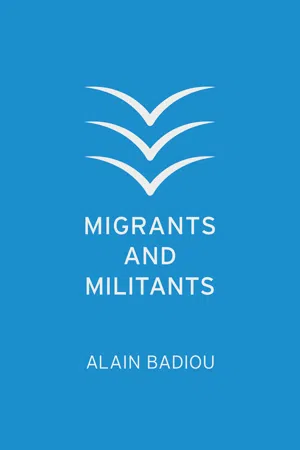In certain situations, apparently, one issue can have the power to wipe away another, which had until then seemed to be the most important one.
We all know that the so-called question of immigration, of migrants, of foreigners, of refugees, was until very recently a question that divided – and could divide even very seriously, and in all sorts of practical ways – public opinion in France, in Europe, and finally in the entire so-called western world – that is, in all the privileged countries on our planet. It could be argued that, for a mere handful of weeks now, in France the question of the yellow vests [gilets jaunes] has swept aside the so-called ‘migrant’ question in the terrors as well as in the enthusiasms of public opinion.
In fact there is a sense in which the question of the yellow vests is exactly the opposite of the so-called migrant question. What is at stake here, essentially, is the destiny of an old France that finds itself threatened. First of all, there are the low-level civil servants, the artisans, the shopkeepers, the small businesspeople, and the farmers, who are revolting against the obvious decline in their status and income and are anxious and angry, given the general lack of interest in their condition and the contempt in which they are held by the transnational oligarchy that runs global capitalism today. This is about stricken lands and territories, about provincial cities that have been turned into ghost towns, about the world of hunting and town meetings. But there is also a vast suburban lower-middle class, and in particular the large number of retired people it contains who, as they struggle to make ends meet, glimpse the spectre of their pauperization, of their proletarianization. This is ultimately about a world in which one can see and feel a very real abandonment by the state powers, themselves subordinate to the powers of capital – an abandonment in which one can also decipher the slow and geological decay into which both Europe and the so-called western democratic world are slipping today. What is being abandoned is the old, moribund, provincial world, at once suburban and colonial, that the bright young graduates at the top business and administrative schools couldn’t care less about – and Macron is their prototype.
We thus have a confrontation between global modernity in the form of an arrogant and ultimately criminal oligarchy on the one side and, on the other, the archaism of an understandable nationwide reaction, driven by that part of society whose little privileges, long in place, are being threatened by the deployment of contemporary capitalism. France, a waning little imperial power up against monsters such as the United States and China, is no longer capable of buying, at a reasonable price in wages, public services, and ‘social advantages’, the support of the lower middle classes, which have always been the central resource of our famous ‘democracies’.
Inevitably, then, we have on one side the state, obedient to the needs of the global market and its handful of billionaires, and on the other side a movement of protest that seems to represent the working class but whose political vision is vague, timid (it carefully avoids the heart of the problem, namely private ownership of the means of production and international competition), nationalistic (at a moment when France represents an investment without a future) fabricated out of false rumours, and whose only truly organized parliamentary component is the far right.
In itself, this sort of conflict offers strictly nothing that could ever lead – that could ever lead us – beyond the sheer persistence of the same dominant structures tediously repeating themselves. This is the price we pay for the near absence, from the asymmetrical conflict that preoccupies us today, of the only other possible way, the way that has the potential to be at once modern and egalitarian: the communist way, to call it by its name. For I have never been able to find any other, despite exhortations from all sides not to use a word that the mass media have rendered unspeakable.
That said, whatever attention we give to this narrowly national situation or to the risks we can discern in a conflict that opposes two protagonists, neither of whom has any political coherence or offers any promise of an egalitarian future, we must at least insist on the inherent internationalism of any new and affirmative political vision. We must insist that the scene of old France belongs to the past, and we must hold on to the conviction that anything truly important today comes down to this: that the point of departure for our thinking must be the world, the whole world. For Marx’s aphorism according to which ‘proletarians have no homeland’ is even truer today – truer for us today, necessarily, than it was in Marx’s time. In other words, our homeland is the world, and our compatriots make up working humankind in all its diversity.
This takes us back to the so-called migrants, who represent the arrival and the presence, among our people, of this infinite diversity and of everything that comes from elsewhere. They are the sign that, because our homeland is becoming theirs without their origin being denied, we must also – ‘we’ standing for the communist politics of our time – expatriate ourselves in the direction of the expatriated; we must, like...




